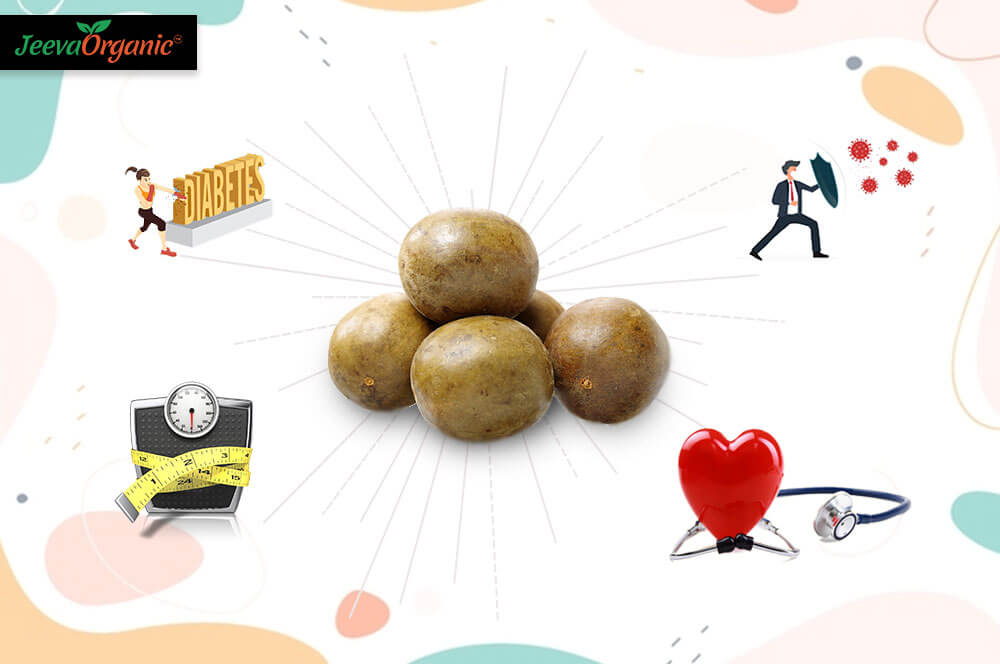Also known as lo Han Guo, monk fruit is a small green melon. Native to Southern China, this fruit is named after the early monks, who initially cultivated it. At present, monk fruit is now earning a lot of popularity among the health-conscious and fitness freaks.
If you are still not aware of the reasons for the hype that this fruit is currently getting, check out the below discussion about the surprising monk fruit benefits.

Nutritional Value of Monk Fruit
- Carbohydrates: 0.8g
- Calories: 0
- Protein: 0g
- Fat: 0g
- Sugar: 0g
- Fiber: 0g
- Sodium: 0g
Essential Health Benefits of Monk Fruit
- Promotes Heart Health
Mogrosides present in monk fruit help prevent cholesterol from building up in the body and triggers HDL cholesterol (good cholesterol). This, in turn, helps prevent heart strokes and promotes healthy cardiovascular functions.
- Aids Weight Loss
One of the best monk fruit benefits is that it can serve as an amazing substitute for table sugar. With no calories, fat, and carbs, monk fruit can be a great sweetener for weight-watchers. Many studies have brought to light that replacing sugar with low-calorie sweeteners can trigger moderate weight loss.
- Prevents Cancer
Artificial sugars are known to cause inflammation, which ultimately leads to cancer. One of the most appreciated monk fruit benefits is that it can offer you natural sweetness and substitute your regular sugar. A number of studies have also brought to light that monk fruit is packed with anti-carcinogen properties that can inhibit the growth and spread of breast and skin tumors. Packed with antioxidants, mogrosides present in monk fruit can also keep cancer cells from growing.
- Fights Against Diabetes
The natural sweetness of monk fruit comes from the naturally occurring substance, mongrosides. Hence, monk fruit does not spike blood sugar levels and is safe for diabetic people. Mongrosides are also known to help reduce blood sugar levels.
- Fights Against Infections
Monk fruit is known to have natural anti-microbial properties that inhibit the growth of harmful microbes and maintain bacterial balance inside the gut. Artificial sweeteners supply harmful bacteria like Candida albicans to the gut. On the contrary, mongrosides, the natural sweetener present in monk fruit feeds the gut with friendly bacteria like L. salivarius, L. acidophilus, L. casei, and B. bifidum.
- Relieves Inflammation
According to a number of studies, mongrosides, the natural sweetener present in monk fruit has anti-inflammatory properties. These anti-inflammatory properties help keep stable blood sugar levels and prevent cancer.
Common Uses of Monk Fruit
- You can replace your regular sugar with monk fruit powder. You can add monk fruit powder to your coffee, lemonade, sauces, oatmeal, yogurt, smoothies, frostings, etc.
- You can mix monk fruit powder to the batter of various bakery items, including bread, brownies, and cakes.
Where to Buy Monk Fruit Powder From?
Monk fruit powder is used predominantly across many industries across the globe. It is used heavily in the food and beverages industries for the manufacture of dairy soft drinks, candies, dairy products, baked items, and condiments.
If you are looking forward to buying organic monk fruit in bulk quantities, you can place your order on Jeeva Organic or Green Jeeva at affordable rates.
Disclaimer:
The above statements are not intended to cure any disease or comply with any health benefits. This is solely for information purposes. Please consult your doctor/health practitioner before consumption of the product. Although we take efforts to keep our website informative, we do not guarantee any medical benefits.
